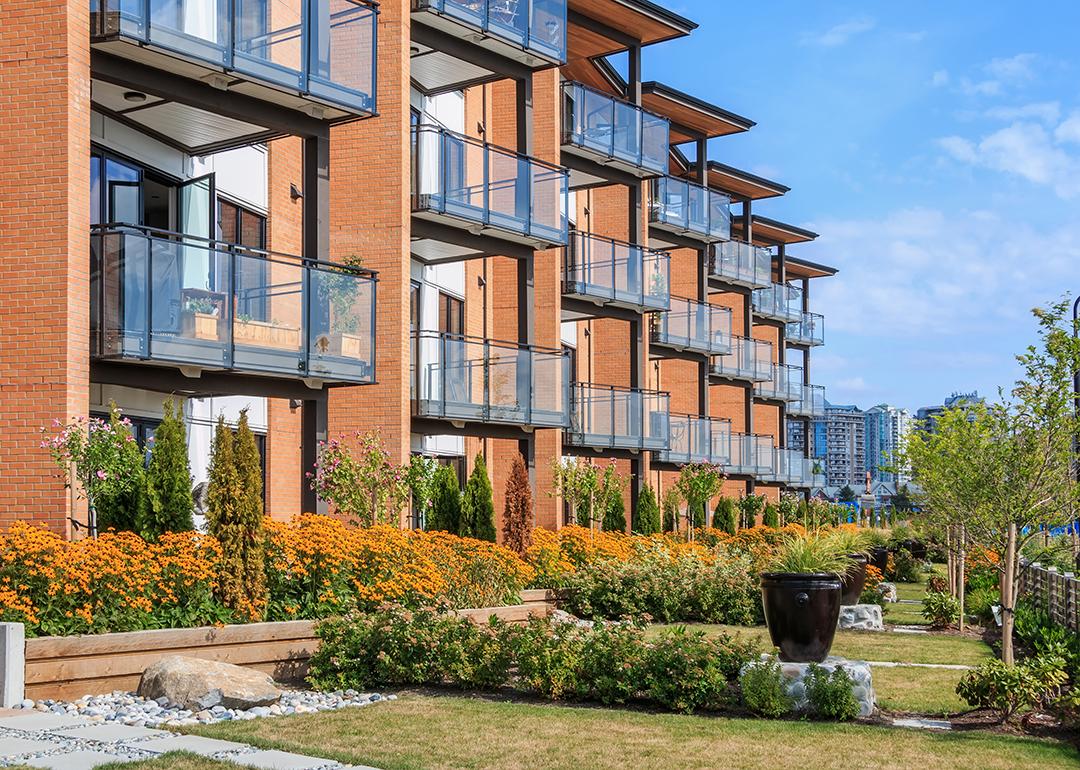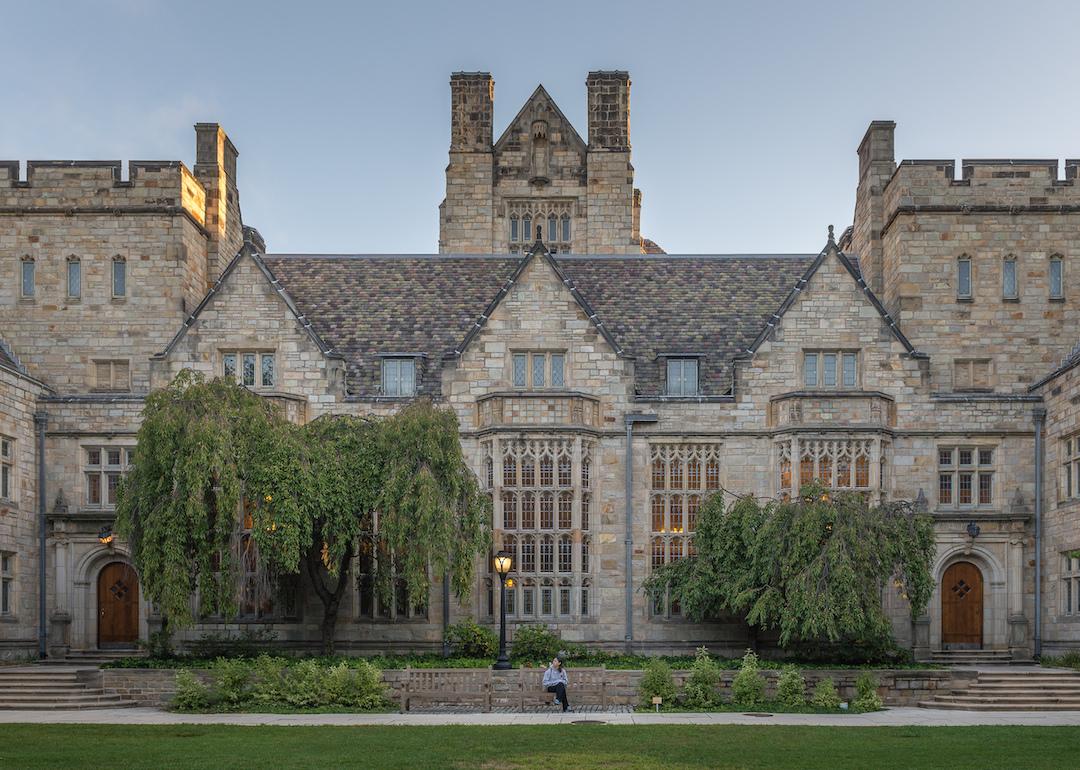
Top real estate insights for renters heading into 2025
This story was produced by RentCafe and reviewed and distributed by Stacker.
Top real estate insights for renters heading into 2025
The real estate market experienced notable transformations in 2024. RentCafe leveraged its data to provide renters with a comprehensive understanding of the latest market dynamics entering 2025.
2024 Rental Market Trends Recap:
- America's rental landscape hit a historic milestone as apartment construction surged past 500,000 units for the first time. And with it, apartment sizes increased to an average of 916 square feet nationwide.
- Minneapolis emerged as the most sought-after city for renters measured by search activity on RentCafe.com in the peak moving season. Meanwhile, Miami maintained its position as the nation's most competitive market, as rising Midwestern cities like suburban Chicago and Milwaukee gained significant ground.
- The year also saw an unprecedented boom in build-to-rent homes, with completions tripling since 2021. At the same time, innovative solutions such as adaptive reuse projects, which involve converting existing buildings into apartments, experienced significant growth, rising by nearly 18%.
- Southern cities offer the best value for the money when it comes to apartment space. Charleston, SC, was the top city for renters on that score. In terms of livability, residents in Portland, ME, get the best mix of living costs and city amenities, while Sunnyvale, CA, renters are in the best position to cover their monthly expenses.
- For Gen Z renters entering the market, the stakes are higher than ever: They're projected to spend $145,000 on rent by age 30 (more than their Millennial predecessors), but they'll also have higher wages.
- Even with historically low mobility rates, Americans who did relocate were driven primarily by the search for better housing and job opportunities. These factors accounted for 28% of all moves.
New Apartment Construction Reached Historic High in 2024
In 2024, the U.S. apartment market reached a historic milestone, with more than 500,000 units completed in a single year for the first time ever. Leading the way, the New York City metro tops the list of completions for the third consecutive year, delivering nearly 33,000 new rentals. It's followed closely by Dallas and Austin, TX. Looking ahead, a staggering two million apartments are expected to be built by 2028, even as new starts slow due to ongoing uncertainties in the market. Cities like Phoenix and Raleigh follow New York's lead in apartment growth, while some former heavyweights in construction are set to reduce their building pace compared to the previous five years.
Larger Apartments Make a Comeback
In 2023, the average size of new apartments in the U.S. bounced back to 916 square feet, thanks to a rise in spacious two- and three-bedroom units meeting renters' need for more space. In particular, Florida cities like Jacksonville and Orlando lead with some of the largest new apartments, while Seattle has the smallest newly built rentals. Even in major cities—like Manhattan, San Francisco, Chicago, and Los Angeles—rentals are getting bigger. For example, Chicago apartments have added an average of 97 square feet throughout the last decade.
Minneapolis Led in Renters' Preferences in First Half of 2024
A RentCafe mid-year rental activity report highlighted a trend of renters taking a more careful approach to their apartment searches by thoroughly exploring multiple options before deciding. Minneapolis led as the most in-demand city in the first half of 2024, securing the top spot for five of the first six months. Atlanta ranked third in rental activity, closely followed by Cleveland, while Washington, D.C. came in sixth. At the regional level, the West solidified its status as the most popular area for renting, outpacing both the South and the Midwest in overall appeal.
Miami Faces Growing Competition From Chicagoland
The national Rental Competitiveness Index score of 74.4 underscored a very competitive rental market in 2024, with more renters staying put compared to 2023—a trend expected to persist into next year. Although Miami remained the hottest rental market, its dominance is being challenged by Suburban Chicago and Milwaukee, reflecting the Midwest's growing appeal among apartment-hunters. At the same time, Louisville, KY, emerged as the fastest-growing market for renters in 2024, driven by insufficient available apartments. North Carolina's Piedmont Triad was close behind. In smaller markets, Lehigh Valley, PA, took the lead as the hottest rental market this past year. Here, more than 80% of renters stayed put after being faced with extremely limited options to choose from.
U.S. Sees Build-to-Rent Housing Boom
Build-to-rent homes are seeing unprecedented growth driven by a mix of trends such as the rise of hybrid work, Millennials reaching their prime years for settling down, and ongoing challenges in the home-buying market. This unique combination of factors has propelled build-to-rent housing to historic heights. In fact, a record-breaking 27,500 build-to-rent homes were completed in 2023—up 75% from the previous year and triple the total from 2021. Leading the way, Phoenix, Dallas, and Atlanta together accounted for nearly one-third of these new units. And, with more than 45,400 homes currently under construction, the outlook for single-family rentals has never been stronger.
Adaptive Reuse Apartments Surge
Adaptive reuse projects surged in 2023, converting 12,713 buildings into apartments—a 17.6% increase from the previous year. This rebound, fueled by rising housing demand, brought activity back to the high levels seen in 2019 and 2020. While office conversions remained a favorite, 2023 saw a shift toward repurposed hotels, with Manhattan emerging as a leader in adaptive reuse. Meanwhile, a fast-growing suburb in Atlanta took the top spot for office conversions, followed by Milwaukee and Indianapolis. With 151,000 new apartments underway, the trend is set to grow, signaling a strong revival of office-to-apartment transformations in the years ahead.
Renters in Southern Cities Get the Most Space for $1,500
Across the U.S., renters can expect an average of 729 square feet of apartment space for $1,500 per month. That said, in 62% of the 200 largest cities, they can find even more room. Specifically, those looking for a spacious apartment on a budget should focus on the South, as more than half of the top 20 large cities offering the most space for this price are located in the Southeast and Southwest. The rest are in the Midwest—a region known for its mix of affordability, job opportunities, and generous living spaces. Wichita, KS, leads the pack among the largest cities by offering the most space for $1,500 (1,359 square feet, to be exact). For comparison, in cities like Boston and the New York City boroughs of Manhattan and Brooklyn, $1,500 grants access to some of the nation's most vibrant neighborhoods, although living spaces tend to be much cozier.
Charleston Is the Best City for Renters
While the perfect city for renters might be hard to find, some come very close. To that end, Charleston, SC, was the best city for renters in 2024 for the second year running, followed by Atlanta and Sarasota, FL. For budget-minded renters, San Marcos, TX, stands out with the lowest cost of living and housing, while Miami leads with the strongest local economy. Meanwhile, if quality of life is your priority, Washington, D.C., is the place to be. The South dominates the rankings, claiming 38 of the top 50 cities for renters.
Gen Z to Pay $145K on Rent by Age 30
Generation Z—the most diverse and highly educated generation in U.S. history—is set to become the highest-earning. But how does their housing affordability stack up against Millennials? With nearly 66 million members, Gen Z is expected to earn $550,000 in their 20s—14% more than Millennials. Earnings are highest in coastal cities like California's San Jose and San Francisco. However, despite higher incomes, Gen Z will spend 14% more on rent by age 30, averaging $145,000 compared to Millennials' $127,000. Both generations, though, allocate about 27% of their income to rent, showing the enduring challenge of housing affordability despite rising wages.
Better Housing, Jobs Are the Top Reasons for Moving
Although only 24 million people moved in the U.S. in 2023 (the lowest number in 25 years), more than half of these moves were for better homes, and five million were for job opportunities—even in the era of remote work. In fact, better housing remains the top motivator for moving, driving 15% of relocations, followed by job-related moves accounting for over 13% of moves. Lastly, the search for affordable housing accounts for 10% of moves. This shift reflects how housing and career priorities continue to shape U.S. cities, with Chicago, New York, Los Angeles, and Boston ranking as top destinations for those seeking new opportunities and improved living conditions.
Portland, ME, Is the Most Livable U.S. City
Finding the perfect place to live starts with livability—the blend of factors that make a location feel like home. After analyzing 139 U.S. metros across 17 key metrics—including cost of living, lifestyle amenities, and community spirit—RentCafe identified the top places that balance everything from affordability to entertainment, thereby offering something for everyone. The result: Portland, ME, is the nation's most livable metro area, thanks to a great balance of urban amenities and natural beauty. It also offers great education, income growth, sports facilities, fresh food, and diverse healthcare, making it ideal for fitness enthusiasts, foodies, and young professionals seeking work/life balance. Coming in second is Lincoln, NE (the perfect spot for community-loving social butterflies), followed by Des Moines, IA, which is great for families that love spending time outdoors and young professionals seeking a more laid-back place to call home.
Silicon Valley Is the Top Renting Sweet Spot in the U.S.
Finding the perfect rental spot isn't just about making more or spending less. Rather, it's about striking a balance where income and expenses work together. Sunnyvale, CA, in Silicon Valley, tops the list of sweet spots for rent in the U.S. by offering the nation's highest median wages that easily cover living costs. Surprise, AZ, near Phoenix, ranks second, followed by three Washington, D.C., suburbs of Arlington, VA; Bethesda, MD; and Alexandria, VA. Texas stands out with the most cities where renters feel financially comfortable, led by Round Rock.



